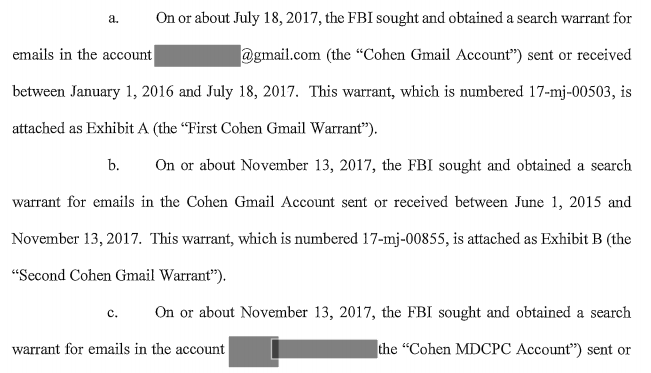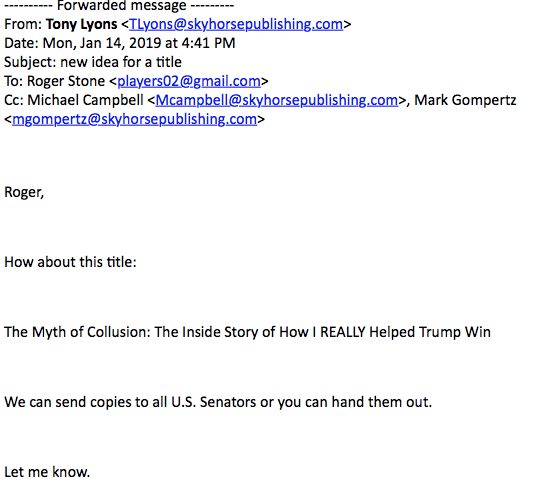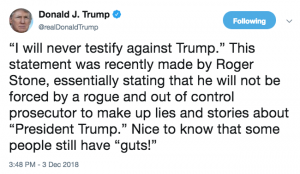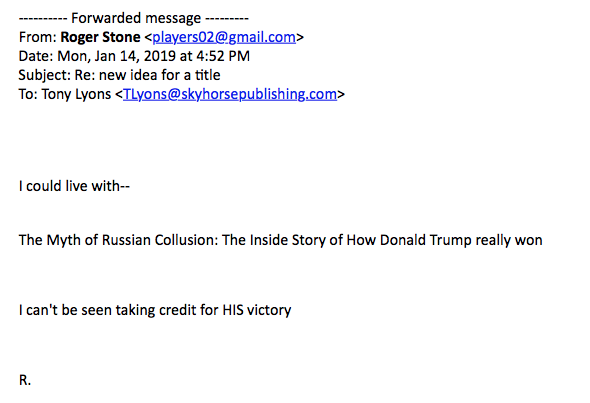The Parallel Tracks of Disclosure on Why Manafort Shared Campaign Polling Data with His Russian Co-Conspirator
No one knows what the first half of this sentence says:
[redacted] the investigation did not establish that members of the Trump Campaign conspired or coordinated with the Russian government in its election interference activities.
But it almost certainly includes language acknowledging evidence that might support (but ultimately was not enough to indict on) a conspiracy charge.
I have twice before demonstrated that the Barr Memo — and so this full sentence — is nowhere near as conclusive with respect to exonerating Trump as a number of people have claimed (and Trump’s equivocations about releasing the report). This post showed how little Barr’s Memo actually incorporates from the Mueller Report. And this post shows that the memo ignores Stone’s coordination with WikiLeaks, presumably because he didn’t coordinate directly with the Russian government.
But (as I’ve said elsewhere), the public record on Paul Manafort’s conduct also makes it clear that the Mueller Report includes inconclusive information on whether the Trump campaign conspired with Russians. This came up extensively, in the discussion of Manafort’s sharing of polling data at his August 2, 2016 meeting with Konstantin Kilimnik, at the February 4 breach hearing.
At the beginning of that discussion, ABJ asked whether Manafort had lied to the grand jury about his motives for sharing polling data. [Throughout this, I’m bolding the redactions but including the content where it’s obvious.]
JUDGE AMY BERMAN JACKSON: I think we can go on to the question of the [redacted; sharing of polling data]. And I don’t have that many questions, mainly because I think it’s pretty straightforward what you’re saying.
So, I would want to ask you whether it’s part of your contention that he lied about the reason [redacted; he shared the data]. I know initially he didn’t even agree that that [redacted; he had shared private polling data], and he didn’t even really agree in the grand jury. He said it just was public information. But, I think there’s some suggestion, at least in the 302, as to what the point was of [redacted].
And so, I’m asking you whether that’s part of this, if he was lying about that?
Because Mueller’s team only needed ABJ to rule that Manafort lied, Andrew Weissmann explained they didn’t need her to reach the issue of motive. But they did discuss motive. Weissmann describes that it wasn’t just for whatever benefit sharing the polling data might provide the campaign, but it would also help Manafort line up his next gig and (probably) get out of debt to Deripaska.
MR. WEISSMANN: So, I don’t think the Court needs to reach that issue, and I don’t know that we’ve presented evidence on the — that issue.
THE COURT: You didn’t. So you just don’t want me to think about it, that’s okay.
MR. WEISSMANN: No. No. No. I’m going to answer your question.
THE COURT: All right.
MR. [WEISSMANN]: I’m just trying to, first, deal with what’s in the record. And I think that in the grand jury, Mr. Manafort said that from his perspective, [redacted], which he admitted at that point was with — he understood that it was going to be given by [redacted] to the [redacted; Ukrainian Oligarchs] and to Mr. [redacted; possibly Deripaska], both. That from his perspective, it was — there was no downside — I’m paraphrasing — it was sort of a win-win. That there was nothing — there was no negatives.
And I think the Government agrees with that, that that was — and, again, you’re just asking for our — if we are theorizing, based on what we presented to you, that we agree that that was a correct assessment.
But, again, for purposes of what’s before you on this issue, what his ultimate motive was on what he thought was going to be [redacted] I don’t think is before you as one of the lies that we’re saying that he told.
It’s more that what he specifically said was, he denied that he had told Mr. Gates [redacted; to bring the polling data to the meeting]. That he would not, in fact, have [redacted] and that he left it to [redacted].
Weissmann then goes on to allege that Manafort lied about sharing this polling data because if he didn’t, it would ruin his chance of getting a pardon.
And our view is, that is a lie. That that is really under — he knew what the Gates 302s were. It’s obviously an extremely sensitive issue. And the motive, I think, is plain from the [redacted], is we can see — we actually have — we can see what it is that he would be worried about, which is that the reaction to the idea that [long redaction] would have, I think, negative consequences in terms of the other motive that Mr. Manafort could have, which is to at least augment his chances for a pardon.
And the proof with respect to that is not just Mr. Gates. So that I will say there’s no contrary evidence to Mr. Gates, but you don’t have just Mr. Gates’s information. You have a series of emails where we know that Mr. Kilimnik, in fact, is reporting [redacted]
And probably the best piece of evidence is you have Mr. Manafort asking Mr. Gates to [redacted; print out polling data]. So, it’s — there’s — from three weeks ago, saying: [redacted].
In an effort to understand why this lie was important, ABJ returns to Manafort’s motive again, which leads Weissmann to point out that the question of why Manafort shared the polling data goes to the core of their inquiry.
THE COURT: I understand why it’s false. And I’m not sure I understand what you said at the beginning, that you — and I understand why you’ve posited that he might not want to be open about this, given the public scrutiny that foreign contacts were under at the time. But, I’m not sure I understand what you’re saying where you say you agree with him when he said it had no downside.
So, this is an important falsehood because it was false? Or is there some larger reason why this is important?
MR. WEISSMANN: So — so, first, in terms of the what it is that the special counsel is tasked with doing, as the Court knows from having that case litigated before you, is that there are different aspects to what we have to look at, and one is Russian efforts to interfere with the election, and the other is contacts, witting or unwitting, by Americans with Russia, and then whether there was — those contacts were more intentional or not. And for us, the issue of [redacted] is in the core of what it is that the special counsel is supposed to be investigating.
My answer, with respect to the Court’s question about what it is — what the defendant’s intent was in terms of what he thought [redacted] I was just trying to answer that question, even though that’s not one of the bases for saying there was a lie here. And so I was just trying to answer that question.
And what I meant by his statement that there’s no downside, is that can you imagine multiple reasons for redacted; sharing polling data]. And I think the only downside —
Weissmann ultimately explains that there was no downside to Manafort to sharing the polling data during the campaign, but there was a downside (angering Trump and therefore losing any hope of a pardon) to the information coming out now.
THE COURT: You meant no downside to him?
MR. WEISSMANN: Yes.
THE COURT: You weren’t suggesting that there was nothing — there’s no scenario under which this could be a bad thing?
MR. WEISSMANN: Oh, sorry. Yes. I meant there was no downside — Mr. Manafort had said there was no downside to Mr. Manafort doing it.
THE COURT: That was where I got confused.
MR. WEISSMANN: Sorry.
THE COURT: All right.
MR. WEISSMANN: And meaning all of this is a benefit. The negative, as I said, was it coming out that he did this.
In her breach ruling, ABJ agreed that Manafort’s sharing of polling data was a key question in Mueller’s inquiry, as it was an intentional link to Russia. She establishes this by noting that Manafort knew the polling data would be shared with someone in Russia (probably Deripaska; though note, this is where ABJ gets the nationality of the two Ukranian oligarchs wrong, which Mueller subsequently corrected her on).
Also, the evidence indicates that it was understood that [redacted] would be [redacted] from Kilimnik [redacted] including [redacted], and [redacted]. Whether Kilimnik is tied to Russian intelligence or he’s not, I think the specific representation by the Office of Special Counsel was that he had been, quote, assessed by the FBI, quote, to have a relationship with Russian intelligence, close quote. Whether that’s true, I have not been provided with the evidence that I would need to decide, nor do I have to decide because it’s outside the scope of this hearing. And whether it’s true or not, one cannot quibble about the materiality of this meeting.
In other words, I disagree with the defendant’s statement in docket 503, filed in connection with the dispute over the redactions, that, quote, the Office of Special Counsel’s explanation as to why Mr. Manafort’s alleged false statements are important and material turns on the claim that he is understood by the FBI to have a relationship with Russian intelligence.
I don’t think that’s a fair characterization of what was said. The intelligence reference was just one factor in a series of factors the prosecutor listed. And the language of the appointment order, “any links,” is sufficiently broad to get over the relatively low hurdle of materiality in this instance, and to make the [redacted] Kilimnik and [redacted] material to the FBI’s inquiry, no matter what his particular relationship was on that date.
Elsewhere, in discussing Manafort’s efforts to downplay Kilimnik’s role in his own witness tampering, ABJ refers to Kilimnik as Manafort’s “Russian conspirator.”
Earlier in the hearing ABJ notes that Manafort’s excuse for why he forgot details of the August 2 meeting only reinforce the likelihood that he shared the polling data to benefit the campaign.
You can’t say you didn’t remember that because your focus at the time was on the campaign. That relates to the campaign. And he wasn’t too busy to arrange and attend the meeting and to send Gates [redacted] that very day. It’s problematic no matter how you look at it.
If he was, as he told me, so single-mindedly focused on the campaign, then the meeting he took time to attend and had [redacted] had a purpose [redacted; to benefit the campaign]. Or, if it was just part of his effort to [redacted; line up the next job], well, in that case he’s not being straight with me about how single-minded he was. It’s not good either way.
She further notes that Manafort took this meeting with his Russian partner in Ukrainian influence peddling even though he was already under press scrutiny for those Ukrainian ties.
[T]he participants made it a point of leaving separate because of the media attention focused at that very time on Manafort’ relationships with Ukraine.
Her ruling also explains at length why sharing polling data would be useful to Kilimnik, citing from Rick Gates’ 302s at length.
In other words, these two filings — to say nothing of the backup provided in the January 15 submission, which includes all but one of Gates’ 302s describing the sharing of the polling data — lay out in some detail the evidence that Manafort clandestinely met with Konstantin Kilimnik on August 2, 2016, in part to share polling data he knew would be passed on to at least one other Russian, probably Deripaska.
And here’s why that’s interesting.
Back in early March, the WaPo moved to liberate all the documents about Manafort’s breach determination. On March 19, Mueller attorneys Adam Jed and Michael Dreeben asked for an extension to April 1, citing the “press of other work.”
The government respectfully requests an extension of time—through and including April 1, 2019—to respond to the motion. The counsel responsible for preparing the response face the press of other work and require additional time to consult within the government.
Three days later, Mueller announced he was done, and submitted his report to Barr. Then, on March 25, all of Mueller’s attorneys withdrew from Manafort’s case, which they haven’t done in other cases (the main pending cases are Mike Flynn, Concord Management, and Roger Stone). Then, on March 27, Mueller and Jonathan Kravis, the AUSA taking over a bunch of Mueller’s cases, asked for another extension, specifically citing the hand-off to Kravis and two others in the DC US Attorney’s Office.
The government respectfully requests a further two-week extension of time—to and including April 15, 2019—to respond to the motion. The Special Counsel’s Office has been primarily handling this matter. On March 22, the Special Counsel announced the end of his investigation and submitted a report to the Attorney General. This matter is being fully transitioned to the U.S. Attorney’s Office. Because of this transition, additional time will be required to prepare a response.
On March 29, Barr wrote the Judiciary Leadership and told them he’d release his redacted version of the Mueller report — which he’ll be redacting with the Mueller’s team — by mid-April, so around April 15.
So there are currently two parallel efforts considering whether to liberate the details of Manafort’s sharing of polling data with Kilimnik and through him Russia:
- The Barr-led effort to declassify a report that Mueller says does not exonerate Trump for obstruction, including the floating of a pardon to Manafort that (in Weissmann’s opinion) led Manafort to lie that and why he shared Trump campaign polling data to be passed on to Russians, which will be done around April 15
- The DC USAO-led effort to unseal the materials on Manafort’s lies, for which there is a status report due on April 15
Kevin Downing — the Manafort lawyer whose primary focus has been on preserving Manafort’s bid for a pardon — already expressed some concern about how the breach documents would be unsealed, to which ABJ sort of punted (while suggesting that she’d entertain precise the press request now before her.
MR. DOWNING: Your Honor, just one other general question: How are we going to handle the process of unredacted down the road? I mean, there’s been a lot of redactions in this case, and the law enforcement basis for it or ongoing grand jury investigations. What is going to be the process to — is the Office of Special Counsel going to notify the Court that the reason stated for a particular redaction no longer exists, or still survives? Is it going to be some sort of process that we can put in place?
THE COURT: Well, in one case, I know with all the search warrants, it was an evolving process. There were things that were withheld from you and then you got them but they were still withheld from the press and then the press got them. But usually things have to be triggered by a motion or request by someone. There may be reasons related to the defense for everything to stay the way it is.
I, right now, without knowing with any particularity what it is that you’re concerned about, or if — and not having the press having filed anything today, asking for anything, I don’t know how to answer that question. But I think that is something that comes up in many cases, cases that were sealed get unsealed later. And if there’s something that you think should be a part of the public record that was sealed and there’s no longer any utility for it, obviously you could first find out if it’s a joint motion and, if not, then you file a motion.
But for now, the prosecutors in DC will be in charge of deciding how much of the information — information that Barr might be trying to suppress, not least because it’s the clearest known evidence how a floated pardon prevented Mueller from fully discovering whether Trump’s campaign conspired with Russia — will come out in more detail via other means.
Update: And now, over a month after Mueller’s correction, three weeks after sentencing, and a week after the entire Mueller team moved on, Manafort submitted his motion for reconsideration from Marc. They’re still fighting about redactions.
As I disclosed last July, I provided information to the FBI on issues related to the Mueller investigation, so I’m going to include disclosure statements on Mueller investigation posts from here on out. I will include the disclosure whether or not the stuff I shared with the FBI pertains to the subject of the post.













